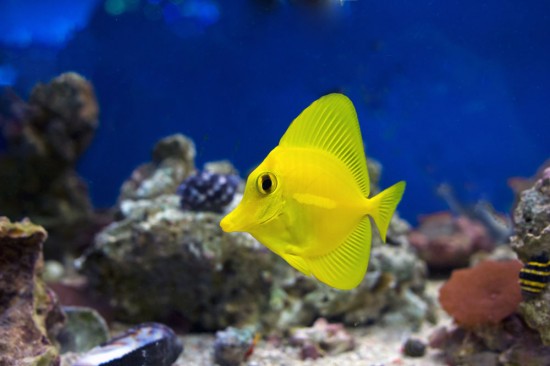

Up until perhaps ten years ago, keeping marine fish at home was considered to be the preserve of the experts, with very few lay folk successfully managing to keep a marine aquarium healthy and viable in the long term. However, with the advances in technology and fish tank equipment that have progressed with time, keeping marine fish at home is no longer the preserve of marine biologists and full time expert hobbyists- many everyday people now successfully manage to keep a thriving, healthy and beautiful marine aquarium as well.
That being said, keeping a marine aquarium is by no means a simple undertaking- the amount of research required beforehand in order to be able to make an informed decision about the type of aquarium to keep and how to keep it, as well as how to set it up and manage it, is considerable. Deciding to set up a marine aquarium is not something that should be rushed into- you will need to spend weeks or even months researching and learning about the unique ecosystem of the tank, how to prepare it, and how to take care of it before going forwards. You may even have to wait several months between getting your tank and placing your first fish within it- so it is fair to say that keeping marine fish is not a casual undertaking, and you will need to commit to being in it for the long haul.
You will certainly need to undergo a fairly steep learning curve before preparing to set up your tank, and this article alone is by no means enough research to get you ready to go. Consider this as a starting point, and a brief run-down of marine aquariums, as well as a basic outline of what you will need, and what it might cost.
The sheer diversity of marine life from across the world runs into millions of different organisms and species, and not all of them will play nicely together just because they live in the salty stuff! The contents of your tank will need to be chosen carefully and combined so as to support life, and of course, some fish and other animals are more difficult to keep than others.
Often, the most eye catching and beautiful marine fish tanks are those that contain a wealth of colourful anemone and coral, providing colour and lush, rich tones to the backdrop of the tank. However, anemones are also some of the hardest creatures to keep healthy and thriving in a tank setting, and so you should consider carefully if this is the best direction to go with for your own tank. Dead or dying anemone and coral in the tank can poison the whole system within just a few days, and so as well as the significant amount of research you will need to do on the tank and fish within it in general, it would be reasonable to say that you will need to double this if you are planning on keeping corals, and especially anemones too.
Marine tanks can broadly be divided into two types: Coral and anemone tanks, and those that just contain fish. While keeping marine fish healthy and thriving is a significant challenge in itself, depending on the species of fish you choose, they are generally considered easier and more forgiving of the rookie tank keeper than more complex systems. Also, some of the most beautiful and eye-catching marine fish cannot be kept in a domestic-sized tank with coral and anemone due to their propensity to snack on them. You may find that the range of types of fish you can keep in your tank is larger in a fish-only setup than if you go the coral and anemone route too.
Marine tanks come in many shapes and sizes, and in specialist retailers that sell marine equipment, you will find the range of available options to be as wide if not wider than that which you can find for tropical and coldwater fish. You can buy very small, ready-to-go setups that hold just a few gallons of water, right through to bespoke made tanks and systems that can take up an entire wall or room of your house.
While buying a small ready-to-go system such as a marine BiOrb may seem like the obvious choice for the beginner, this will dramatically limit you in terms of the amount of fish and other livestock that you can keep in the tank. Also, the larger the tank and the volume of water that it contains, the more stable the system will be, and so the less prone it will be to suffering from mistakes or upsets in the system.
Generally, a good rule for keeping fish of any type, is to buy the largest size of tank and set up that you can afford, both in terms of space and money- and never overstock it.
Keeping marine fish is definitely much more expensive than keeping tropical or coldwater fish- both in terms of the time commitment involved, and the financial price. The cost of setting up a tank from scratch with everything you need can run to well over £1,000, even for just a small system- and that’s before you take into account the cost of the fish themselves, which are generally pricey, and the ongoing running costs.
If you don’t have a significant amount of both time and money to dedicate to your tank, then a marine setup may not be for you.
The setup needed to keep marine fish is totally different to that for keeping freshwater fish, and exactly what you will need depends very much on the livestock and fish you intend to keep within it. It is wise to have a fairly clear idea of what you eventually hope to keep in your tank from the get-go, as this will influence what you need to buy and how your tank needs to be set up.
For a fairly basic beginner setup of any size, you will need all or most of the items listed below:
One important point to bear in mind when keeping marine fish, is that marine fish and other living organisms are rarely commercially bred in large numbers in captivity, and most are sourced directly from the oceans of the world and imported.
Where and how you buy your marine tank’s living inhabitants is important, to ensure the ongoing conservation and sustainability of the oceans that supplied them. Your fish and livestock supplier should be knowledgeable about the origins of the fish that they are selling, and able to tell you about their provenance and how they are caught, and how remaining stocks are sustained.
Items such as live rock should not be overlooked either- this is often harvested from the oceans by chipping away at existing coral reefs, a process that should not be encouraged. Responsible retailers will sell live rock harvested from the ocean floor after storms and natural breakdown without harming the exiting reef structures.
Still interested in keeping a marine tank? Check out the links below for a wealth of further information.
 Different Methods Of Rabbit Communication
Different Methods
Different Methods Of Rabbit Communication
Different Methods
 Is It Ever A Good Idea To Give Your Child A Pet For Christmas?
Is It Ever A Good
Is It Ever A Good Idea To Give Your Child A Pet For Christmas?
Is It Ever A Good
 How To Safely Introduce Two Gerbils
How To Safely Int
How To Safely Introduce Two Gerbils
How To Safely Int
 Decoding Dog Communication Via Urine Markers
Decoding Dog Comm
Decoding Dog Communication Via Urine Markers
Decoding Dog Comm
 How To Deal With Ear Infections In Guinea Pigs
How To Deal With
How To Deal With Ear Infections In Guinea Pigs
How To Deal With
Copyright © 2005-2016 Pet Information All Rights Reserved
Contact us: www162date@outlook.com